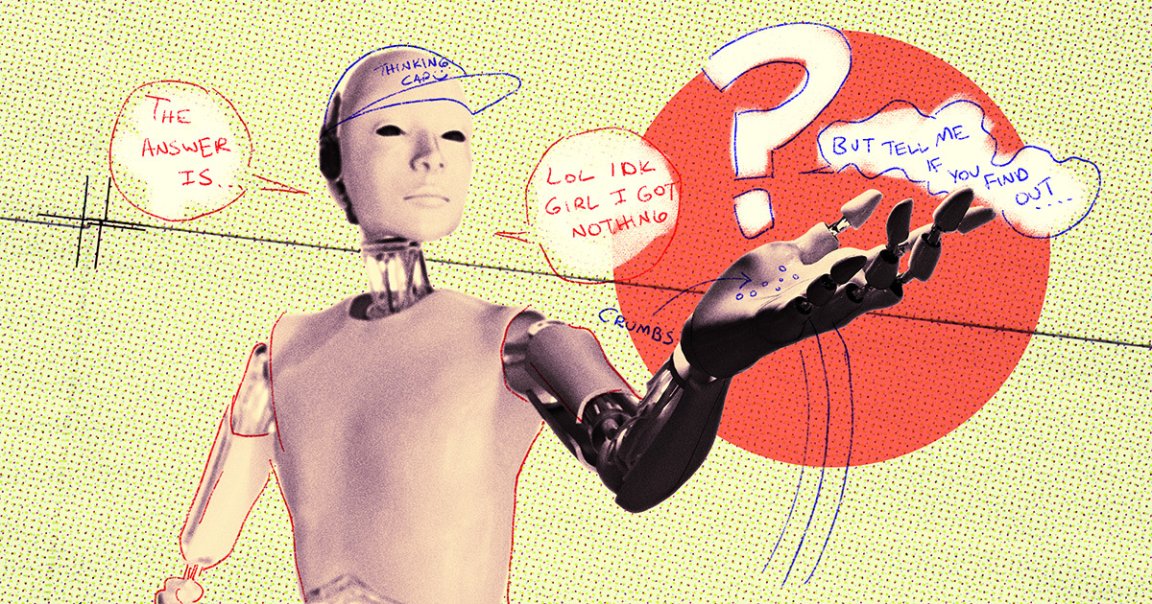
As artificial intelligence becomes integrated into our daily lives, researchers are working to tackle what might be its most glaring and enduring issue: that AI “hallucinates,” or boldly spits out lies, when it doesn’t know the answer.
This rampant AI problem is, according to researchers who spoke to the Wall Street Journal, rooted in a reticence to be caught not knowing something.
According to José Hernández-Orallo, a professor at Spain’s Valencian Research Institute for Artificial Intelligence, hallucination comes down to the way AI models are trained.
“The original reason why they hallucinate is because if you don’t guess anything,” Hernández-Orallo told the WSJ, “you don’t have any chance of succeeding.”
To demonstrate the issue, WSJ writer Ben Fritz devised a simple test: asking multiple advanced AI models who he was married to, a question that is not easily Google-able. The columnist was given multiple bizarre answers — a tennis influencer, a writer he’d never met, and an Iowan he’d never heard of — none of whom were correct.
When I tried it out for myself, the hallucinations were even stranger: Google’s Gemini informed me that I was married to a Syrian artist named Ahmad Durak Sibai, who I’d never heard of before who appears to have passed away in the 1980s.
Roi Cohen and Konstantin Dobler, a pair of doctoral candidates at Germany’s Hasso Plattner Institut, posit in their recent research that the issue is simple: AI models, like most humans, are reluctant to say “I don’t know” when asked a question whose answer lies outside of their training data. As a result, they make stuff up and confidently pass it off as fact.
The Hasso Plattner researchers say they’ve devised a way to intervene early in the AI training process to teach models about the concept of uncertainty. Using their methodology, models not only can respond with an “IDK,” but also seem to give more accurate answers when they do have the info.
Like with humans, however, the models that Cohen and Dobler taught uncertainty sometimes responded with an IDK even when they did know — the AI version of an insecure schoolchild who claims not to know an answer when called upon in class, even when they do.
Despite that setback, the researchers are confident that their hack is worthwhile, especially in situations where accuracy is paramount.
“It’s about having useful systems to deploy,” Dobler said, “even if they’re not superintelligent.”
Already, companies like Anthropic are injecting uncertainty into their chatbots. As the WSJ writer Fritz noted, Anthropic’s Claude was the only one to admit it didn’t know the answer to the question. (and when I tested that question out on Claude, the chatbot declined to answer and warned that there was a possibility that it may “hallucinate” a response.)
Beyond increasing the accuracy of responses, Hernández-Orallo, the Spanish professor, said that adding uncertainty to AI models may increase trust as well.
“When you ask someone a difficult question and they say ‘I cannot answer,’ I think that builds trust,” Hernández-Orallo told the WSJ. “We are not following that common-sense advice when we build AI.”
After being told that I am married to a nonagenarian artist entirely unknown to me, this Futurism reporter has to agree.
More on AI hallucinations: Apple’s AI Is Constantly Butchering Huge News Stories Sent to Millions of Users